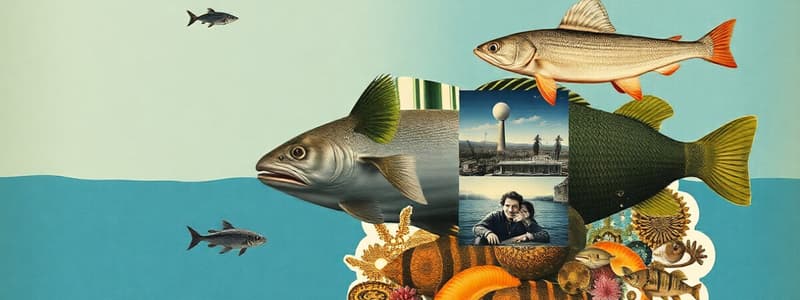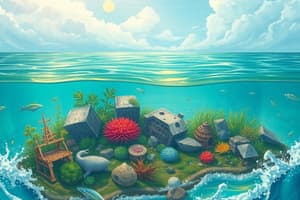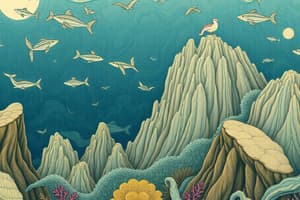Podcast
Questions and Answers
What percentage of the Earth's surface is covered by the ocean?
What percentage of the Earth's surface is covered by the ocean?
- 70% (correct)
- 90%
- 85%
- 50%
Which of the following features is NOT found in ocean basins?
Which of the following features is NOT found in ocean basins?
- Islands
- Mountains (correct)
- Ridges
- Trenches
What is the role of microbes in the ocean?
What is the role of microbes in the ocean?
- They contribute to nutrient depletion in ocean waters.
- They are responsible for ocean pollution.
- They are the largest predators in marine ecosystems.
- They are the most important primary producers. (correct)
What connects all major watersheds to the ocean?
What connects all major watersheds to the ocean?
Which of the following statements about ocean evaporation and precipitation is true?
Which of the following statements about ocean evaporation and precipitation is true?
What role do phytoplankton play in the aquatic ecosystem?
What role do phytoplankton play in the aquatic ecosystem?
How does the ocean help regulate climate?
How does the ocean help regulate climate?
What can happen if the ocean becomes acidic?
What can happen if the ocean becomes acidic?
Why is the balance of pH in ocean water important?
Why is the balance of pH in ocean water important?
How have humans negatively impacted the ocean environment?
How have humans negatively impacted the ocean environment?
Flashcards
Phytoplankton
Phytoplankton
Microscopic plants and bacteria that form the base of the aquatic food web. They produce oxygen through photosynthesis and play a crucial role in the carbon cycle.
Ocean Carbon Sink
Ocean Carbon Sink
The process of the ocean absorbing and storing carbon dioxide from the atmosphere. This helps regulate Earth's climate.
Ocean-Atmosphere Heat Exchange
Ocean-Atmosphere Heat Exchange
The exchange of heat between the ocean and the atmosphere, which drives weather patterns and ocean currents.
Ocean pH
Ocean pH
Signup and view all the flashcards
Ocean Acidification
Ocean Acidification
Signup and view all the flashcards
One Global Ocean
One Global Ocean
Signup and view all the flashcards
Oceanic Crust
Oceanic Crust
Signup and view all the flashcards
Earth's Water Cycle
Earth's Water Cycle
Signup and view all the flashcards
Microbes in the Ocean
Microbes in the Ocean
Signup and view all the flashcards
Ocean Biodiversity
Ocean Biodiversity
Signup and view all the flashcards
Study Notes
Earth's Ocean: A Comprehensive Overview
- Earth's ocean covers approximately 70% of its surface.
- The ocean is vital for life, driving the water cycle and moderating global temperatures.
- One global ocean is comprised of interconnected basins (e.g., North Pacific, South Atlantic).
- Ocean basins have diverse features like trenches, ridges, and plateaus, influenced by plate tectonics.
- The ocean floor holds a wealth of life forms, just as diverse as terrestrial landscapes.
- Ocean water's properties include salinity, density, freezing point and pH balance, crucial for marine ecosystems.
Ocean Life and Ecosystems
- The ocean supports a vast array of life, from microscopic microbes to large marine mammals like blue whales.
- Most ocean life is microscopic, forming the base of the food web.
- Phytoplankton, microscopic plants and bacteria, are essential primary producers, generating oxygen and consuming CO2.
- Phytoplankton thrive in shallow, warm areas like continental shelves.
- The ocean absorbs significant amounts of atmospheric CO2 and methane, playing a role in the carbon cycle.
Ocean and Weather/Climate
- The ocean absorbs solar radiation, regulating global temperatures.
- Heat exchange between the ocean and atmosphere drives weather patterns (winds, currents, storms).
- El Niño Southern Oscillation (ENSO) and La Niña are examples of ocean-atmosphere interactions that affect global weather.
- Ocean currents, heat absorption & release, and water vapor transportation significantly influence Earth's climate.
Ocean Chemistry and Human Impact
- Ocean water is a complex system of organic and inorganic substances.
- Salinity (salt content) varies across different locations, influencing ocean currents.
- Ocean acidification results from increased CO2 absorption, threatening marine life.
- Human activities, including pollution and resource extraction, impact ocean chemistry and life.
- Changes in temperature and pH affect species survival and biological diversity (e.g., coral bleaching, shell formation inhibition).
Human-Ocean Interconnections
- Ocean health impacts human lives in many ways: supplying freshwater, promoting climate regulation, providing resources (food, medicines, minerals).
- Coastal communities and economies rely heavily on the ocean.
- The ocean connects cultures, is a source of inspiration, recreation and discovery.
- Human activity significantly impacts the ocean's ecosystems, necessitating responsible resource management and conservation.
Ocean Exploration and Oceanography
- Less than 15% of the ocean has been explored.
- Ocean exploration is interdisciplinary, involving scientists from various fields.
- Oceanographic research includes studying the ocean's systems and processes using various technologies (ships, robots, satellites).
- Understanding the ocean is crucial for human survival.
Studying That Suits You
Use AI to generate personalized quizzes and flashcards to suit your learning preferences.




